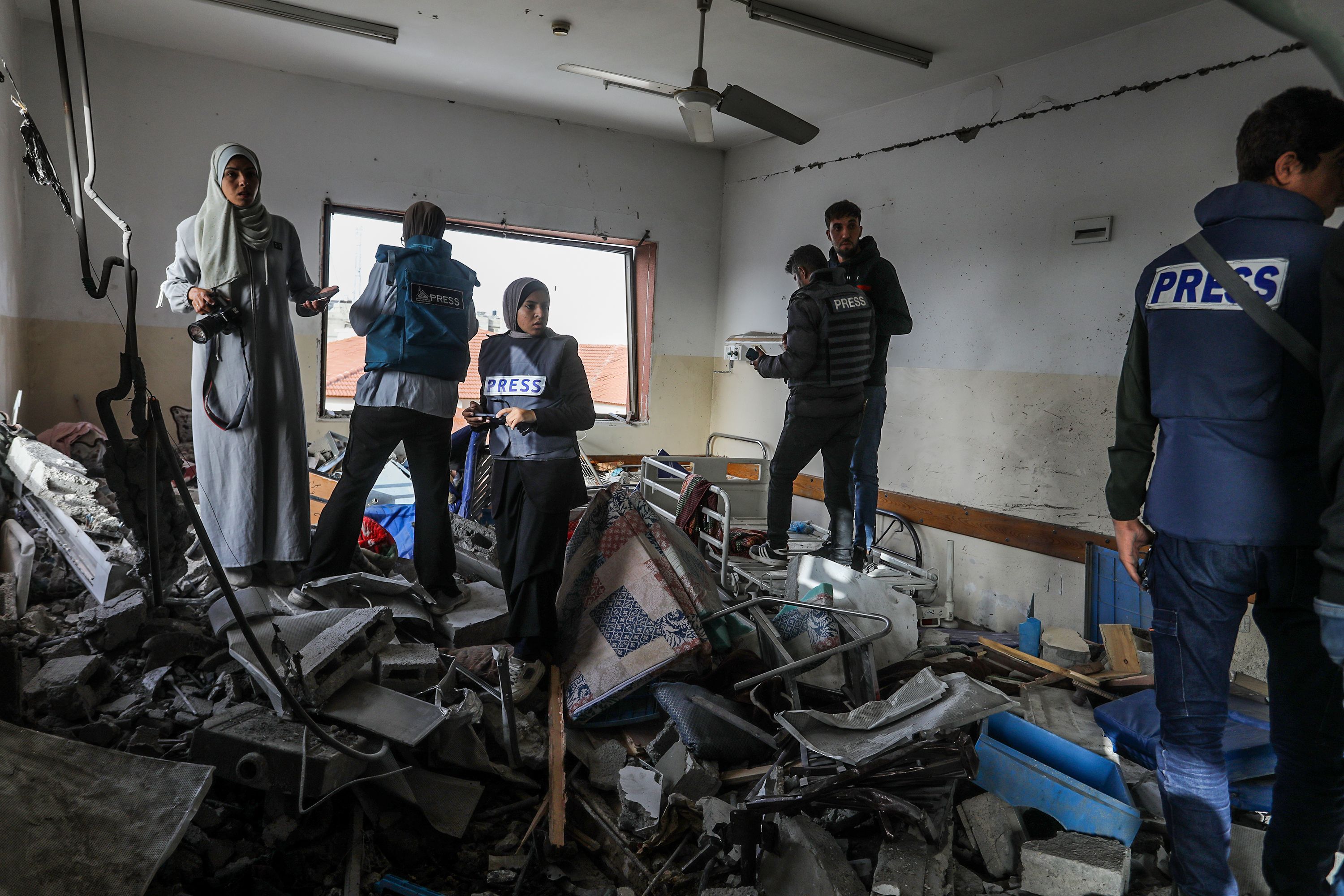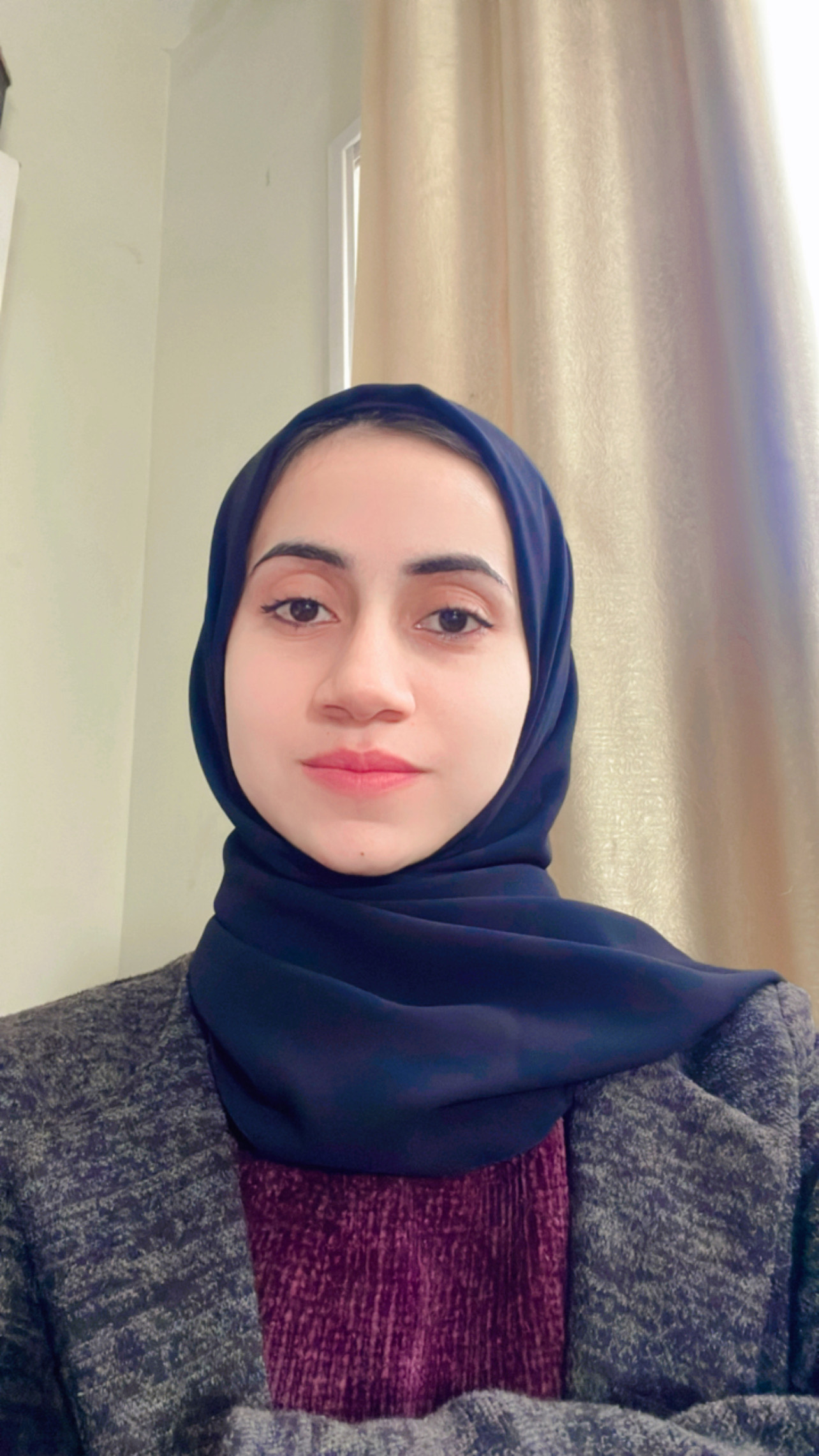"أحب العالم تشوفنا، تعرف أيش هو قطاع غزة"، هذا ما قالته سلمى القدومي بعد سؤالها عن سبب ممارستها مهنة الصحافة رغم خلفيتها الأكاديمية في مجال الأدب الإنجليزي، وهي واحدة من الصحفيين المواطنين الذين يغطون حرب الإبادة الجماعية في فلسطين.
تعمل سلمى صحفية مصورة مستقلة لعدة وكالات عالمية ومحلية منذ عام 2008. ولديها العديد من الأعمال بعضها نشر في marie claire، middle east monitor ، وموقع حبر، كما شاركت في أعمال عرضت على نيويورك تايمز، وكالة الأنباء الفرنسية، الجزيرة، بي بي سي ورويترز.
تخرجت من جامعة الأزهر بشهادة بكالوريوس في الأدب الإنجليزي، لكنها ظلت مرتبطة بشغف التصوير. أتيحت لها فرصة التدرب في هذا المجال بعد أن اختيرت مع زملائها المتفوقين في الدفعة للمشاركة في تدريب لدى الوكالة الفرنسية للإعلام.
كانت بدايات عملها في التصوير جماليا مقتصرة على المناظر الطبيعية في غزة، لكن بعد مسيرات العودة سنة 2018 وشن حرب على القطاع، قررت سلمى العمل في الصحافة لنقل الواقع عن طريق الصور.
واجهت سلمى الكثير من الصعوبات خلال عملها مثل الكثيرين ممن يمارسون مهنة الصحافة في قطاع غزة، ففي الوقت الذي كانت فيه محاصرة لمدة 90 يوما في مستشفى القدس بتل الهوى، عملت على توثيق المجازر، لكن محتواها على مواقع التواصل الاجتماعي تعرّض للحجب والرقابة والحذف، بالإضافة إلى المنع من التعليق أو التفاعل. لكن التحدي الأثقل كان اضطرارها مع عائلتها للنزوح المتكرر نتيجة للقصف الإسرائيلي، وما يصاحب ذلك من صعوبات الحياة اليومية التي فرضتها الحرب.
كانت بدايات عمل سلمى في التصوير جماليا مقتصرة على المناظر الطبيعية في غزة، لكن بعد مسيرات العودة سنة 2018 وشن حرب على القطاع، قررت سلمى العمل في الصحافة لنقل الواقع عن طريق الصور.
بين الإبادة والرقابة الرقمية
وصف تقرير "مراسلون بلا حدود" صادر في كانون الأول/ ديسمبر 2024، قطاع غزة بأنها أخطر منطقة على حياة الصحفيين حاليا، حيث كان ميداناً لمصرع نحو ثلث صحفيي العالم الذين لقوا حتفهم على يد الجيش الإسرائيلي أثناء ممارستهم نشاطهم الصحفي، حيث قَتَلت القوات الإسرائيلية أكثر من 200 صحفي فلسطيني خلال سنة واحدة وستة أشهر فقط من الحرب.
يرى الصحفي هشام زقوت في كتاب "وحدنا غطينا الحرب.. شهادات من قطاع غزة والضفة الغربية" -الصادر عن معهد الجزيرة للإعلام- أن تغطية الحرب في غزة من أخطر المهام وأقربها إلى الموت، فالصحفي هناك هدف مباشر للاحتلال الإسرائيلي دون مسوغات أو حجج مشروعة، ومضطر دائما لإيجاد بدائل لأجهزته وأدواته المفقودة بسبب الحرب المستمرة.
تشمل مخاطر ممارسة صحافة المواطن في غزة المخاطر الجسدية وضغوط الرقابة والمخاوف الأخلاقية حول الدقة والتحقق والمصداقية، إذ اختار الكثير من الصحفيين المواطنين مواقع التواصل الاجتماعي كملجأ لنشر المحتوى، ليواجهوا بعدها معضلات حقيقية تحجب حرية النشر في البيئة الرقمية.
وفقا لتقرير موقع حملة الصادر في آذار/مارس 2025، قامت شركة "ميتا" بتغييرات جذرية تتيح مجالا أوسع لانتشار المحتوى العبري العنيف تجاه الفلسطينيين عبر الشبكة، حيث تصبح أنظمة فلترة المحتوى أكثر تركيزا على ما يصنف بأنه "شديد الخطورة"، ما يعني أن عددا كبيرا من مظاهر العنف الرقمية التي خضعت سابقا للإدارة ستبقى قائمة على المنصة، ليبلغ عدد المنشورات التحريضية ضد الفلسطينيين، حسب آخر إحصائية لموقع حملة 2969 منشورا.
تعمل نور زياد التري، الصحفية المواطنة، مساعدة ميدانية لدى المجلس الفلسطيني للإسكان في قطاع غزة، لكنها في الوقت نفسه توثق جرائم الحرب بالكتابة والصورة. ويتعرض محتواها على منصات التواصل الاجتماعي باستمرار إلى الحجب والحذف.
فُرضت على نور ممارسة الصحافة نتيجة ظروف الحصار والحرب، فبعد أن تواصل معها أحد الصحفيين لتكتب قصتها الشخصية وتصف معاناتها، عرض عليها أن تكتب مقالات أخرى لصالح مجلة ballast الناطقة بالفرنسية، مع إضافة صور فوتوغرافية، ومن هنا بدأت رحلة نور في عالم الصحافة ثم استطاعت لاحقا أن تطور مهاراتها في التصوير والتحرير الصحفي من خلال التحاقها بشركة عين الميديا بالقطاع.
تشمل مخاطر ممارسة صحافة المواطن في غزة المخاطر الجسدية وضغوط الرقابة والمخاوف الأخلاقية حول الدقة والتحقق والمصداقية، إذ اختار الكثير من الصحفيين المواطنين مواقع التواصل الاجتماعي كملجأ لنشر المحتوى، ليواجهوا بعدها معضلات حقيقية تحجب حرية النشر في البيئة الرقمية.
نور ليست الصحفية الوحيدة التي تعرضت لمضايقات تمس حرية التعبير عبر مواقع التواصل الاجتماعي، فحسب تصريح نداء البسومي، المنسقة الاعلامية بمنصة صدى سوشل، خلال منتدى معهد الجزيرة للإعلام بعنوان "الصحافة وسؤال الجدوى في زمن الإبادة واضطراب المعلومات"، تلقت المنصة 130 شكوى من مستخدمي مواقع التواصل الاجتماعي تضمنت حذف منشوراتهم حول محرقة الخيام برفح في شهر ايار/ مايو من العام الماضي، بينما لم تتعرض المنشورات الإسرائيلية للحذف رغم أنها تصف الحدث بأنه "استهداف للإرهابيين" ناهيك عن التعتيم الإعلامي عن طريق حجب المنشورات الداعمة للقضية الفلسطينية ومنع الفلسطينيين من الاطلاع عليها.
بين التضحية والتوثيق
ما يتعرض له الصحفيون في غزة من معاناة يومية تتمثل في النزوح المتكرر، صعوبة الوصول إلى الغذاء والشراب، تعسر الولوج إلى شبكة الإنترنت وخطر القصف المستمر، ليس شيئا مقارنة بحجم الألم عندما يستهدف الاحتلال الإسرائيلي عائلاتهم وذويهم ورفقائهم من طرف في محاولة لإسكاتهم، إذ تشير إحصائية لنقابة الصحفيين الفلسطينيين، أن الاحتلال قصف 152 منزلا لعائلات صحفيين أدى إلى استشهاد 664 منهم.
تقول نور التري: "الخوف صار يمنعني من حمل الكاميرا والتصوير، وبما أنه من المتوقع استهداف أي شخص يحاول نقل الصورة خارج غزة، فقد توقفت مؤقتا حماية للأهالي وسلامتهم وللعائلة التي تستضيفنا، حتى لا أكون سببا في تعريضهم للخطر، وزاد هذا الخوف بعد استهداف المصورين فاطمة حسونة، ومحمود السراج". هكذا تصف نور المخاوف التي صارت تحاصر الصحفي وتضعه في معضلة أخلاقية متأرجحة بين مواصلة توثيق الجرائم، وتعريض من حوله للموت المحتم.
ثمة صحفيون آخرون لم يتوقفوا عن العمل رغم التهديد المتواصل، ومن بين هؤلاء الصحفية المستقلة فداء القدرة ذات 35 عاما، أم لثلاثة أطفال، تعيش تنقلات قسرية دائمة بحثًا عن الأمان في ظل الاستهداف المستمر. دخلت فداء إلى عالم الصحافة سنة 2014، تكتب تقارير وقصصًا إنسانية باللغة الإنجليزية تتناول فيها تفاصيل الحياة اليومية تحت الاحتلال والحصار. نشرت أعمالها في مواقع دولية تهتم بالقضية الفلسطينية مثل الجزيرة الإنجليزية وإلكترونيك انتفاضة.
فُرضت على نور ممارسة الصحافة نتيجة ظروف الحصار والحرب، فبعد أن تواصل معها أحد الصحفيين لتكتب قصتها الشخصية وتصف معاناتها، عرض عليها أن تكتب مقالات أخرى لصالح مجلة ballast الناطقة بالفرنسية، مع إضافة صور فوتوغرافية، ومن هنا بدأت رحلة نور في عالم الصحافة ثم استطاعت لاحقا أن تطور مهاراتها في التصوير والتحرير الصحفي من خلال التحاقها بشركة عين الميديا بالقطاع.
كانت بدايتها في الترجمة، حيث عملت في المكتب الإعلامي الحكومي في غزة، كما كانت تكتب لوكالة الرأي باللغة الإنجليزية. بعدها بدأت تراسل المواقع الأجنبية التي تهتم بفلسطين. لم تدرس فداء الصحافة أكاديميًا، بل تخصصت في اللغة الإنجليزية وآدابها، لكن رغبتها في أن تكون صوت فلسطين إلى العالم، دفعتها لتطوير قدراتها الصحفية عبر الالتحاق بالدورات المتعددة في المجال والانخراط في التجربة المباشرة من خلال العمل مع المؤسسات إعلامية، بالإضافة إلى التعلم الذاتي.
تواجه فداء صعوبات عديدة، فإلى جانب النزوح المستمر، لا وجود لحاضنات أو بيئات تستأمن عليها أطفالها للتفرغ للعمل، كما فقدت معداتها الأساسية كالهاتف المحمول والحاسوب بسبب الحرب، الأمر الذي حد من إنتاجيتها، لكنها تواصل عملها من غزة.
عند سؤالها عن سبب استمرارها رغم المخاطر، أجابت فداء:"أستمر لأنني شاهدة، لأنني أعيش الألم ذاته الذي يعيشه من أكتب عنهم، لأنني أرى في كل أم فقدت طفلًا انعكاسًا لمخاوفي، وفي كل شهادة أمانة لا بد أن تصل. الصحافة من غزة لم تعد ترفًا ولا حتى وظيفة، بل مقاومة بالكلمة، محاولة مستمرة لحماية الحقيقة من الغرق في الصمت أو التشويه".
أما بيسان عماد المبحوح - وهي صحفية مواطنة - تشرح الدافع وراء الاستمرار في التغطية قائلة: "أنا مستمرة في التغطية، مستمرة رغم كل شيء، مستمرة حتى آخر نفس، لا يمكن أن أدفن هذه الرسالة ولا أنقلها لمجرد خوفي من الاحتلال. هذا الاحتلال الذي يستهدف الأبرياء والأطفال، لن أسلم منه سواءً كنت صحفية أو أشتغل في وظيفة أخرى".
لقد دخلت بيسان مجال الصحافة منذ عامين ونصف فقط، لكنها استطاعت أن تدمج بين الكتابة الصحفية وخلفيتها الأكاديمية في اللغة الانجليزية فاتحة بذلك مجالا أوسع لإيصال وضع الحياة في غزة.
بدأت بيسان التدرب على الكتابة الصحفية عندما كانت طالبة في الجامعة مستفيدة من تدريبات في عدة مؤسسات، وحاليا تعمل مع الجريدة اليابانية kyodonews، كما نشرت بعض الأعمال في وسائل إعلامية عدة من بينها موقع The New Arab وThe Irish Times.
قصص كل من سلمى، نور، فداء وبيسان ليست حالات استثنائية، بل جزء من ظاهرة أوسع، ففي السياق الفلسطيني حيث يتقاطع الموت مع كل تفاصيل الحياة، لا يتبقى للإنسان إلا أن يسعى لتسجيل ما يتعرض له كتابةَ، صوتًا وصورة، كمحاولة لحفظ التاريخ في زمن يكثر فيه التضليل وترسخ فيه ثقافة تجاهل الواقع المؤلم.
هكذا، تبرز صحافة المواطن كفعل مقاومة وكأداة للبقاء؛ لأن هذا النمط من الصحافة لا يقتصر على التوثيق فقط، بل يتحدى الرقابة ويكسر احتكار الرواية في معركة السرديات المستمرة.









































